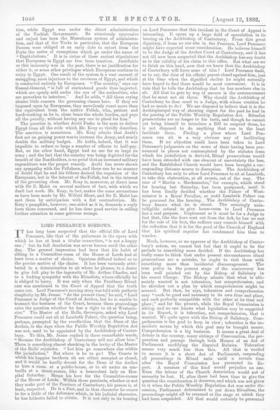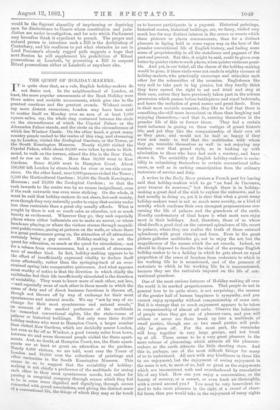LORD PENZANCE'S SORROWS.
IT has long been suspected that the official life of Lord Penzance, like that of the policeman in the opera with which lie has at least a titular connection, " is not a happy one ;" but its full desolation was never known until the other day. The general impression had been that his habit of sitting in a Committee-room of the House of Lords had at least been a matter of choice. Opinions differed indeed as to the precise motive of the choice. It has been variously attri- buted to a determination to sit where he pleases, to a desire to give full play to the ingenuity of Mr. Arthur Charles, and to a lurking sympathy with the Ritualists, whom officially he is obliged to harry. It was only when the Prestbury Ritual case was mentioned in the Court of Appeal that the truth came out. Lord Penzance's moving story was told with pathetic simplicity by Mr. Jenne. "At the present time," he said, " Lord Penzance is Judge of the Court of Arches, but he is unable to transact the business of the Court, because these proceedings raise the question whether he has a right to sit at Westmin- ster." The Master of the Rolls, thereupon, asked why Lord Penzance could not sit at Lambeth Palace, the question being, perhaps, prompted by the recollection that the Dean of the Arches, in the days when the Public Worship Regulation Act was not, used to be appointed by the Archbishop of Canter- bury. To this, Mr. Jeune replied in these remarkable words, " Because the Archbishop of Canterbury will not allow him." There is something almost shocking in the levity of the Master of the Rolls' rejoinder. " Let him go somewhere else within the jurisdiction." Bat where is he to go ? The Courts in which his happier brethren sit are either occupied or closed, and it would be hardly decent for the Dean of the Arches to hire a room at a public-house, or to sit under an um- brella at a street-corner, like a benevolent lady on Hos- pital Saturday. Hence his love for the Committee-rooms of the House of Lords. Within these precincts, whether or not they make part of the Province of Canterbury, his person is, at least, respected. He is a Peer, and in that character he comes in for a little of the deference which, in his judicial character, he has hitherto failed to obtain. It is not only in its bearing on Lord Penzance that this incident in the Court of Appeal is interesting. It opens up a large field of speculation in its bearing on the Archbishop of Canterbury. From this great dignitary, if from no one else in the Province, Lord Penzance might have expected some consideration. He believes himself to be the Judge of the Arches Court of Canterbury, and it has not till now been suspected that the Archbishop has any doubt as to the validity of his claim to this office. Bat what are we to think on this head, now that we know that the Archbishop of Canterbury will have none of him ? Lord Penzance finds, so to say, the dOor of his official parent closed against him, just at the time when the dignified shelter he might naturally have hoped to find there would be most convenient. It is in vain that he tells the Archbishop that he has nowhere else to sit. All that he gets by way of answer is the announcement that he must not sit there. Why should the Archbishop of Canterbury be thus cruel to a Judge, with whose creation he had so much to do ? We are disposed to believe that it is the Archiepiscopal way of showing regret for the part he had in the passing of the Public Worship Regulation Act. Ritualist prosecutions are no longer to his taste, and though he cannot yet bring himself to introduce a Bill to suspend them, he is not disposed to do anything that can in the least facilitate them. Finding a place where Lord Pen- zance can sit is a very obvious way of facilitating them. If no objection could have been taken to Lord Penzance's judgments on the score of their having been pro- nounced in places not contemplated by the statutes from which his jurisdiction is derived, Ritual prosecutions would have been attended with one element of uncertainty the less, and the Established Church would have been brought a cor- responding distance nearer to disruption. The Archbishop of Canterbury has only to allow Lord Penzance to sit at Lambeth, to take this obstruction, at all events, out of the way. The case of " Martin v. Mackonochie," for example, which stood for hearing last Saturday, has been postponed, until it has been finally decided whether the Palace of West- minster is a Royal Peculiar, or until Lambeth Palace can be procured for the hearing. The Archbishop of Canter- bury knows what he is about. The seemingly unin- telligible refusal to give house-room to Lord Penzance has a real purpose. Unpleasant as it must be for a Judge to feel that, like the dove sent out from the Ark, he has no rest for the sole of his foot, the sufferer may console himself with the reflection that it is for the good of the Church of England that his spiritual superior has condemned him thus to wander.
Much, however, as we approve of the Archbishop of Canter- bury's action, we cannot but feel that it ought to be the prelude to something more decided. If the Archbishop has really come to think that under present circumstances ritual prosecutions are a mistake, he ought to visit them with something more than incidental discouragement. The true policy in the present stage of the controversy has been well pointed out by the Bishop of Salisbury in his recent Charge. The Bishop admits that what is ulti- mately wanted is not toleration, but comprehension, and he sketches out a plan by which comprehension might be secured. But then, he says, toleration and comprehension may "each be good and necessary in its own time and place, and each perfectly compatible with the other at its time and place ;" and for the present, while the Royal Commission is Bitting, and no one knows what legislation may be suggested in its Report, it is toleration, not comprehension, that is wanted. We quite agree with the Bishop of Salisbury. Com- prehension is the goal to keep in view ; toleration is the im- mediate means by which this goal may be brought nearer. Comprehension is a big business. It means a great deal of debate in the country, many sittings of Convocation, the pre- paration and passage through both Houses of an Act of Parliament modifying the disputed Rubrics. Toleration means very much less than this. All that is needed to secure it is a short Act of Parliament, suspending all proceedings in Ritual suits until a certain time after the Royal Commission has presented its Re- port. A measure of this kind would prejudice no one. Even the labour of the Church Association would not of necessity be lost. If, after there had been time to give the question the consideration it deserves, and which was not given to it when the Public Worship Regulation Act was under dis- cussion, Parliament determined to put down Ritualism, the proceedings might all be resumed at the stage at which they had been suspended. All that would certainly be prevented
would be the flagrant absurdity of imprisoning or depriving men for disobedience to Courts whose constitution and juris- diction are under investigation, and for acts which Parliament may hereafter think it expedient to permit. The proper and natural person to introduce such a Bill is the Archbishop of Canterbury, and his readiness to put what obstacles he can in Lord Penzance's already rugged path suggests a hope that next Session he will supplement his prohibition of Ritual prosecutions at Lambeth, by presenting a- Bill to suspend Ritual prosecutions either at Lambeth or anywhere else.































 Previous page
Previous page